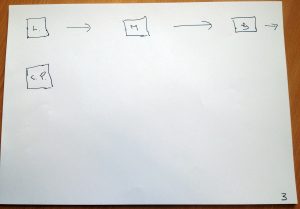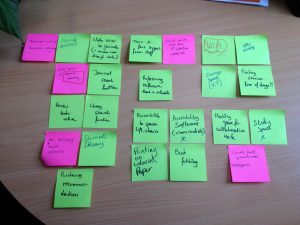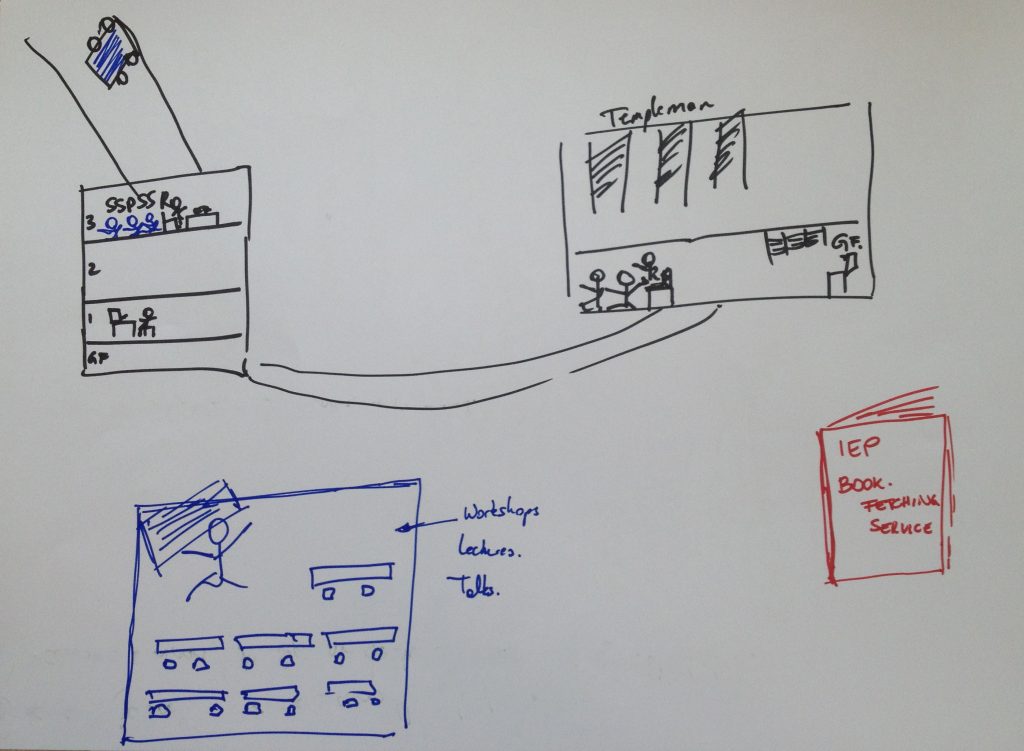We have a small group of staff in Information Services who meet up regularly with representatives from UELT and the Mature Students society to figure out how we can better support part-time and mature students.
In March, Anisa Heritage (from Front Line Services) and I organised some user experience research to better understand how IT and library services fit into their study day.
The techniques we used were cognitive mapping, interviewing, and a bit of open card sorting.
We found that the interview and the cognitive mapping were both really powerful, and highly recommend them as techniques. They are both great techniques to uncover unexpected information from the students, things we would not have thought to ask them.
IS staff can read the transcripts or listen to the recordings on our UX Sharepoint site.
Recruiting students
We emailed out through a mailing list for part-time students, the Graduate School, and approached students through the UKC Mature Student Society Facebook group. We started with a Doodle poll and then used the same communication channels to invite students to the two most popular slots.
In the end, only a handful students were able to attend. Five came to a workshop and one agreed to be interviewed separately. They were all PhD students.
As incentives we offered refreshments at the workshop. It was actually difficult to combine the workshop activities with eating sandwiches, and the students who came along came because they were engaged and wanted to be there. So we learned that coffee and cookies will be more user friendly in future!
Format
Interview
I met one of the students in the Library Cafe and carried out a half-hour interview, which I recorded on my iPhone with the Voice Record Pro app (this worked very well, in spite of a considerable amount of background chatter).The interview was unscripted, and I asked very open questions around her study habits and her typical study day.
Her anwers gave a useful insight into the challenges of studying for a research degree while working full time, as well as coping with a physical disabilty that makes using touch screens difficult (IS staff can listen to or read a transcript of the interview).
Cognitive mapping
In the workshop, we asked the five students to each draw a map of their “typical day on campus” in 6 minutes, changing to a different colour pen every two minutes (black, then blue, then red). We then asked each of the students to explain their map and recorded their responses.
This technique worked really well, because it prompted each student to reflect and talk about their individual experience. Some issues raised by one student would then spark input and discussion from others.
Even when the map looked very basic, as in the example below (L stands for library, M for meeting with supervisor, G for Gulbenkian, and C.P. for car park), it led the student to talk about a whole range of issues, including car parking, the library building works, signage, the helpfulness of the staff, subject support, noise, e-resources, RefWorks, security, and e-books.

IS staff can read all the transcripts on the UX Sharepoint site, or listen to the audio. Key quotes are highlighted in the transcripts.
Open card sorting
We only had a few minutes at the end to ask the students “What are the most important library and IT services for you?”. Bearing in mind these were all research postgraduates, the services they highlighted were:
- access to resources – journals, newspapers, document delivery, purchase recommendations, and being able to renew online
- accessibility (two of the students had disabilities): spaces, lifts, chairs, accessibility software, printing on coloured paper and the book fetching service
- IT: VPN access, storage space, free printing; WiFi was so taken for granted that it was only mentioned as an afterthought, but then declared essential
- study space: silent areas and meeting space for collaborative work
- staff: face-to-face support and inductions throughout the year (this was from a student who started her degree in the spring)
- reliable referencing software (RefWorks had emerged as a sore point in the cognitive mapping exercise).

Next steps
Anisa and I fed back to the rest of the Part-time, Distance Learning and Mature Students Support group, and we’ve identified 5 areas that we want to address, working with colleagues within Information Services and across the University:
- Car parking for mature and part-time students
- Study areas in the library – too open and noisy, and with unsuitable furniture
- RefWorks
- Service triaging – joining up University and Library support services
- Templeman Library redevelopment (do more UX research when the building work is finished).

